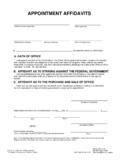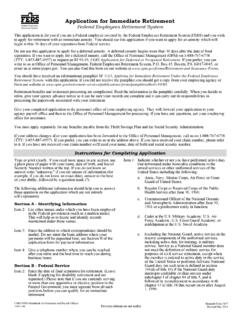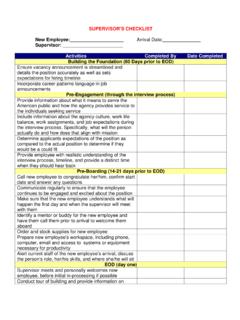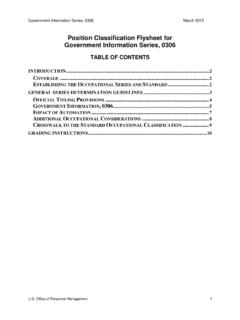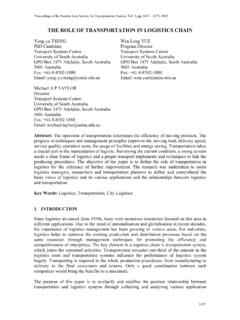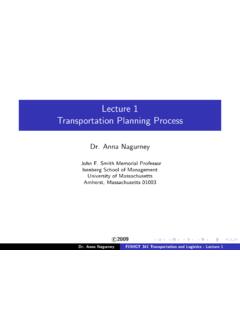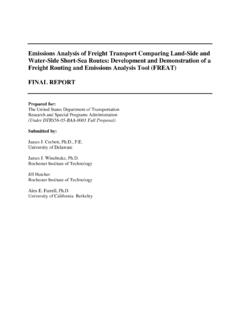Transcription of Position Classification Flysheet for Logistics Management ...
1 Logistics Management Series, GS-0346 TS-78 January 1987. Position Classification Flysheet for Logistics Management Series, GS-0346. Table of Contents SERIES 2. SERIES COVERAGE .. 2. EXCLUSIONS .. 4. DISTINGUISHING BETWEEN Logistics Management AND OTHER 4. AUTHORIZED TITLES .. 8. OCCUPATIONAL INFORMATION .. 8. GRADING 14. EXPLANATORY MEMORANDUM* .. 15. Office of Personnel Management 1. Logistics Management Series, GS-0346 TS-78 January 1987. SERIES DEFINITION. This series covers positions concerned with directing, developing, or performing Logistics Management operations that involve planning, coordinating, or evaluating the logistical actions required to support a specified mission, weapons system, or other designated program. The work involves (1) identifying the specific requirements for money, manpower, material, facilities, and services needed to support the program and (2) correlating those requirements with program plans to assure that the needed support is provided at the right time and place.
2 Logistics work requires (1) knowledge of agency program planning, funding, and Management information systems, (2) broad knowledge of the organization and functions of activities involved in providing logistical support, and (3) ability to coordinate and evaluate the efforts of functional specialists to identify specific requirements and to develop and adjust plans and schedules for the actions needed to meet each requirement on time. Positions in this series require some degree of specialized knowledge of some or all of the Logistics support activities involved. The paramount qualification requirement, however, is the ability to integrate the separate functions in planning or implementing a Logistics Management program. (Positions in which specialized knowledges of Logistics support functions are the paramount requirement are classified to whichever specialized or general series is most appropriate.). (This standard supersedes the series coverage standard for the Logistics Management Series, GS-0346, issued in June 1972.)
3 SERIES COVERAGE. The primary responsibilities of Logistics Management specialists are: -- To identify all activities that will be involved in providing needed logistical support;. -- To integrate the actions required of each activity into a comprehensive Logistics plan in support of or to be incorporated into overall program plans;. -- To monitor progress toward meeting the Logistics plan and to identify the cause and impact of delays or other problems (varying degrees of responsibility for taking actions to prevent or overcome such problems may also be included);. -- To adjust plans and schedules for all related actions as required by delays or changes to Logistics requirements; and -- To evaluate plans for and provision of logistical support for feasibility, efficiency, and economy, and to develop alternatives when required. Office of Personnel Management 2. Logistics Management Series, GS-0346 TS-78 January 1987. The performance of this work requires the application of broad knowledges of a wide variety of Logistics support activities.
4 These include, but are not limited to: -- The determination of detailed requirements, within available or allocated resources, for funds, manpower, facilities, equipment, supplies, and services;. -- The design and development, procurement, production, storage, distribution, maintenance, transportation, utilization, and disposal of material;. -- The procurement or design and construction, operation, maintenance, and disposal of facilities;. -- The acquisition and training of personnel; and -- The acquisition or furnishing of such services as communications and those required to meet personnel needs ( , housing, commissary services, food services). The Logistics Management specialist typically is concerned with most or all of these activities, but is not required to be fully competent to the extent of being a specialist in each field. The work is performed through consultation with technical specialists in each function on specific requirements and capabilities, lead times, costs, and other matters affecting Logistics planning.
5 However, the Logistics Management specialist must understand the functional fields involved in sufficient depth to accurately understand and analyze the Logistics Management implications of the information obtained. Some Logistics work includes responsibility for substantive decisions that require extensive technical and specialized knowledges of one or more logistical functional areas. When these knowledges primarily involve one occupation or occupational group, the Position should be classified in the appropriate series within that group ( , Contracting Series, GS-1102, General Supply Series, GS-2001). When the specialized knowledges required involve two or more occupational series or groups, with none predominant, the Position is classifiable to this series, provided that the ability to coordinate and integrate the specialized functions into a total Logistics Management program is the paramount requirement. NOTE: Some Logistics Management positions may involve Logistics work which is unique to a specific Logistics program not delineated in this standard.
6 The fact that the duties of a Position are not specifically described in the Series Coverage and Occupational Information does not prohibit the use of the standard. The majority of positions classified to this series are found in the military establishment. The information contained in this standard in large part addresses Logistics Management work as it is performed in a military environment. This should not preclude, however, the Classification to this series of positions in any agency, military or civilian, when the duties, responsibilities, and qualifications required meet the overall intent of the standard. Office of Personnel Management 3. Logistics Management Series, GS-0346 TS-78 January 1987. EXCLUSIONS. The following types of positions are excluded from this series: 1. Positions which require the qualifications of a professional engineer. Such positions are classified to whichever specialized or general series in the Engineering and Architecture Group, GS-0800, best represents the engineering discipline required.
7 2. Positions which have as their paramount qualification requirement a substantive specialized knowledge of one or more supply occupations. Such positions are to be classified to whichever general or specialized series in the Supply Group, GS-2000, will best identify the knowledges and skills required. 3. Positions for which the primary duties are to supervise, direct, plan, and coordinate a variety of service functions that are principally work supporting. Such positions are to be classified to the Support Services Administration Series, GS-0342. 4. Positions which involve analyzing current or proposed operating programs to evaluate their actual or potential effectiveness in achieving objectives, when the primary qualification requirements are analytical ability and knowledge of a program other than Logistics Management . Such positions are classified to the Management and Program Analysis Series, GS-0343. 5. Positions which involve examining or studying work processes, and devising methods, procedures, organizational arrangements, and related matters for the purpose of improving the effectiveness and economy of work programs or organizations.
8 Such positions, while similar to Logistics Management positions in methodology, do not require knowledge of specialized Logistics functional programs, and are classified to the Management and Program Analysis Series, GS-0343. 6. Positions which involve two-grade interval administrative work for which no other more specialized series is appropriate. Such positions are classified to the Miscellaneous Administration and Program Series, GS-0301. DISTINGUISHING BETWEEN Logistics Management AND. OTHER OCCUPATIONS. Occasionally, a review of the duties and responsibilities assigned to a Position may not result in information explicit enough to determine proper series allocation. In such cases it becomes necessary to consider such additional factors as the qualification requirements and sources of recruitment, the line of progression, the mission of the organization in which the Position is located, the purpose for which the Position was established, and the character and support requirements of the mission, weapon system, or program being supported.
9 Office of Personnel Management 4. Logistics Management Series, GS-0346 TS-78 January 1987. Some positions which require extensive coordination and interrelationship with numerous Logistics functions may initially appear to be properly classified to the Logistics Management Series. Analysis of such positions, however, often leads to the determination that the paramount qualification requirement is possession of the knowledges, skills, and abilities identified with a specialized functional series. Engineering Professional engineers are often found in organizations which have missions oriented toward the planning and Management of Logistics operations. This is particularly true in organizations which are involved in acquisition Logistics and Integrated Logistics Support. Work involving the performance of duties which require the qualifications of a professional engineer in addition to carrying out Logistics Management responsibilities should be classified to whichever series in the Engineering and Architecture Group, GS-0800, best represents the engineering discipline required.
10 Conversely, work which is sometimes highly technical in nature, such as translating design and engineering data into Logistics support concepts and determining subsequent requirements, but which does not require the knowledges, skills, and abilities of a professional engineer, is Logistics Management work. This work is to be classified to the Logistics Management Series, GS-0346, even though it is being performed by an employee who meets the qualification requirements of a professional engineer. Equipment Specialist Some work requires the application of an in depth technical knowledge of a weapon system, subsystem, or piece of equipment in combination with a working knowledge of a variety of Logistics support functions. For example, work of this type may involve the development of technical data or the evaluation of contractor developed operation and repair manuals. When the paramount requirement for such work is a technical knowledge of equipment and its inner workings, it should be classified to the Equipment Services Series, GS-1670.

